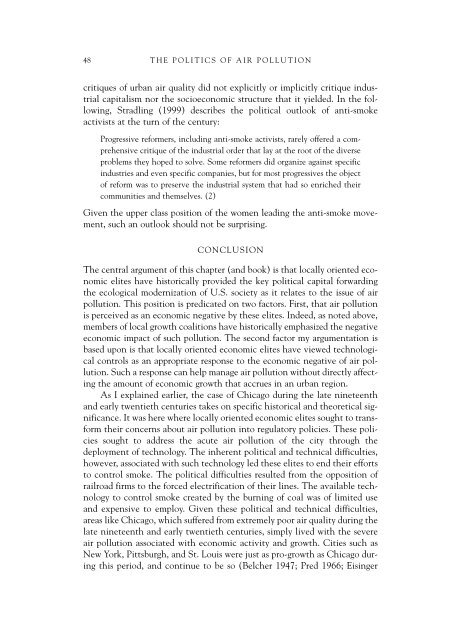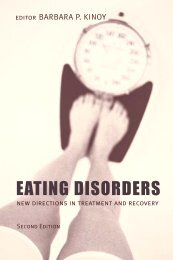THE FAILURE OF TECHNOLOGY 47nati, the Wednesday Club of St. Louis, and the Ladies’ Health ProtectiveAssociation of Pittsburgh. These groups’ most significant contribution to theclean air movement was to draw public attention to the air pollution problem(Grinder 1978; Platt 1995; Flanagan 1996; Stradling 1999; Dewey 2000).These women’s groups were not mass organizations, with membershiplargely limited to the hundreds and very low thousands. Moreover, suchgroups had few working class members. Dewey (2000) explains:Working class wives and mothers might have favored smoke abatement...,and they almost certainly hated the smoke that ruined their laundry,befouled their homes, threatened their families’ health, but most of themprobably did not have the time or energy left over from their daily tasks toattend meetings or organize clubs. (25)Instead, the women’s organizations that took up the smoke question werein large part made up of upper-class women (Grinder 1980; Stradling 1999;Dewey 2000). For example, in writing about the Ladies’ Health ProtectiveAssociation, Angela Gugliotta (2000, 173) takes note of the class backgroundof this group when she writes that in 1892 “the elite women of theLadies’ Health Protective Association took the decisive public action againstsmoke” in Pittsburgh. Dale Grinder (1980), in his work on the politics ofsmoke between the Civil War and World War I, acknowledges that the leadershipof anti-smoke women’s organizations was largely drawn from the upperstrata of society. Grinder (1980) writes that “since only those with leisuretime could devote themselves to most reformist causes, upper-middle-classwomen directed the clubs’ anti-smoke efforts.” He adds:Leadership in the local smoke abatement campaigns included Mrs. John B.Sherwood of Chicago, Mrs. Charles P. Taft of Cincinnati, Miss Kate McKnightof Pittsburgh, and Mrs. Ernest R. Kroeger of St. Louis, all members ofthe upper middle class, if not the social register [a publication identifyingmembers of the U.S. upper class].Moreover, “Both the Wednesday Club of St. Louis and the Twentieth CenturyClub of Pittsburgh, in the years prior to World War I, constructed clubhousesthat indicated a membership of great wealth” (88).G. William Domhoff, who has written extensively on the politicalactivity of the U.S. upper class and corporate elite (1967; 1970; 2002),explains that members of the feminine portion of the upper class have historicallyvolunteered in significant numbers in efforts that often deal withsocial ills (2002, 54–56). Drawing upon sociological work done on upperclass women, Domhoff (2002) points out that these women view their civicand charitable work “as a protection of the American way of life” (55). Inthe case of air pollution, upper-class women were seeking to aestheticallyimprove the urban milieu through the application of technology, but their
48THE POLITICS OF AIR POLLUTIONcritiques of urban air quality did not explicitly or implicitly critique industrialcapitalism nor the socioeconomic structure that it yielded. In the following,Stradling (1999) describes the political outlook of anti-smokeactivists at the turn of the century:Progressive reformers, including anti-smoke activists, rarely offered a comprehensivecritique of the industrial order that lay at the root of the diverseproblems they hoped to solve. Some reformers did organize against specificindustries and even specific companies, but for most progressives the objectof reform was to preserve the industrial system that had so enriched theircommunities and themselves. (2)Given the upper class position of the women leading the anti-smoke movement,such an outlook should not be surprising.CONCLUSIONThe central argument of this chapter (and book) is that locally oriented economicelites have historically provided the key political capital forwardingthe ecological modernization of U.S. society as it relates to the issue of airpollution. This position is predicated on two factors. First, that air pollutionis perceived as an economic negative by these elites. Indeed, as noted above,members of local growth coalitions have historically emphasized the negativeeconomic impact of such pollution. The second factor my argumentation isbased upon is that locally oriented economic elites have viewed technologicalcontrols as an appropriate response to the economic negative of air pollution.Such a response can help manage air pollution without directly affectingthe amount of economic growth that accrues in an urban region.As I explained earlier, the case of Chicago during the late nineteenthand early twentieth centuries takes on specific historical and theoretical significance.It was here where locally oriented economic elites sought to transformtheir concerns about air pollution into regulatory policies. These policiessought to address the acute air pollution of the city through thedeployment of technology. The inherent political and technical difficulties,however, associated with such technology led these elites to end their effortsto control smoke. The political difficulties resulted from the opposition ofrailroad firms to the forced electrification of their lines. The available technologyto control smoke created by the burning of coal was of limited useand expensive to employ. Given these political and technical difficulties,areas like Chicago, which suffered from extremely poor air quality during thelate nineteenth and early twentieth centuries, simply lived with the severeair pollution associated with economic activity and growth. Cities such asNew York, Pittsburgh, and St. Louis were just as pro-growth as Chicago duringthis period, and continue to be so (Belcher 1947; Pred 1966; Eisinger
- Page 2:
The Politics of Air Pollution
- Page 7: ContentsAcknowledgmentsviiONELocal
- Page 12 and 13: LOCAL GROWTH COALITIONS 3tion, such
- Page 14 and 15: LOCAL GROWTH COALITIONS 5how the U.
- Page 16 and 17: LOCAL GROWTH COALITIONS 7growth (Ta
- Page 18 and 19: LOCAL GROWTH COALITIONS 9In this pe
- Page 20 and 21: LOCAL GROWTH COALITIONS 11ity tend
- Page 22 and 23: LOCAL GROWTH COALITIONS 13In the ar
- Page 24 and 25: LOCAL GROWTH COALITIONS 15who reduc
- Page 26 and 27: LOCAL GROWTH COALITIONS 17cally mod
- Page 28 and 29: TWOPolitical Economy and thePolicym
- Page 30 and 31: THE POLICYMAKING PROCESS 21moves to
- Page 32 and 33: THE POLICYMAKING PROCESS 23eral gov
- Page 34 and 35: THE POLICYMAKING PROCESS 25groups
- Page 36 and 37: THE POLICYMAKING PROCESS 27Given in
- Page 38 and 39: THE POLICYMAKING PROCESS 29tions, t
- Page 40 and 41: THE POLICYMAKING PROCESS 31the Conf
- Page 42: THE POLICYMAKING PROCESS 33lars 199
- Page 45 and 46: 36THE POLITICS OF AIR POLLUTIONCOAL
- Page 47 and 48: 38THE POLITICS OF AIR POLLUTIONa go
- Page 49 and 50: 40THE POLITICS OF AIR POLLUTIONrush
- Page 51 and 52: 42THE POLITICS OF AIR POLLUTIONattr
- Page 53 and 54: 44THE POLITICS OF AIR POLLUTIONScot
- Page 55: 46THE POLITICS OF AIR POLLUTIONthe
- Page 59 and 60: 50THE POLITICS OF AIR POLLUTIONwhen
- Page 61 and 62: 52THE POLITICS OF AIR POLLUTIONin t
- Page 63 and 64: 54THE POLITICS OF AIR POLLUTIONThe
- Page 65 and 66: 56THE POLITICS OF AIR POLLUTIONfirm
- Page 67 and 68: 58THE POLITICS OF AIR POLLUTIONinno
- Page 69 and 70: 60THE POLITICS OF AIR POLLUTIONThe
- Page 71 and 72: 62THE POLITICS OF AIR POLLUTIONFHA
- Page 73 and 74: 64THE POLITICS OF AIR POLLUTIONgone
- Page 75 and 76: 66THE POLITICS OF AIR POLLUTIONPres
- Page 78 and 79: FIVEThe Establishment ofAutomobile
- Page 80 and 81: AUTOMOBILE EMISSION STANDARDS 71ext
- Page 82 and 83: AUTOMOBILE EMISSION STANDARDS 73Ano
- Page 84 and 85: AUTOMOBILE EMISSION STANDARDS 75the
- Page 86 and 87: AUTOMOBILE EMISSION STANDARDS 77thr
- Page 88 and 89: AUTOMOBILE EMISSION STANDARDS 79was
- Page 90 and 91: AUTOMOBILE EMISSION STANDARDS 81exp
- Page 92 and 93: AUTOMOBILE EMISSION STANDARDS 83acc
- Page 94 and 95: AUTOMOBILE EMISSION STANDARDS 85Thu
- Page 96 and 97: AUTOMOBILE EMISSION STANDARDS 87A n
- Page 98 and 99: SIXDemocratic Ethics,Environmental
- Page 100 and 101: DEMOCRATIC ETHICS 91At the core of
- Page 102 and 103: DEMOCRATIC ETHICS 93senior attorney
- Page 104 and 105: DEMOCRATIC ETHICS 95ments mount cha
- Page 106 and 107:
DEMOCRATIC ETHICS 97frameworks, as
- Page 108 and 109:
DEMOCRATIC ETHICS 99mobiles and gas
- Page 110 and 111:
DEMOCRATIC ETHICS 101the ecological
- Page 112 and 113:
CONCLUSIONPolitical Power andGlobal
- Page 114 and 115:
CONCLUSION 105quality became manife
- Page 116:
CONCLUSION 107lation, the U.S. econ
- Page 119 and 120:
110THE POLITICS OF AIR POLLUTIONCHA
- Page 121 and 122:
112THE POLITICS OF AIR POLLUTION6.
- Page 123 and 124:
114THE POLITICS OF AIR POLLUTION4.
- Page 126 and 127:
BibliographyAcher, Robin. 2001. “
- Page 128 and 129:
BIBLIOGRAPHY 119Brienes, Marvin. 19
- Page 130 and 131:
BIBLIOGRAPHY 121Cole, Luke W., and
- Page 132 and 133:
BIBLIOGRAPHY 123——— . 2002. W
- Page 134 and 135:
BIBLIOGRAPHY 125——— . 1975.
- Page 136 and 137:
BIBLIOGRAPHY 127Hayward, Clarissa R
- Page 138 and 139:
BIBLIOGRAPHY 129——— . 2001. E
- Page 140 and 141:
BIBLIOGRAPHY 131——— . 1988.
- Page 142 and 143:
BIBLIOGRAPHY 133Perez-Pena, Richard
- Page 144 and 145:
BIBLIOGRAPHY 135Runte, Alfred. 1997
- Page 146 and 147:
BIBLIOGRAPHY 137Tarr, Joel A. 1996.
- Page 148:
BIBLIOGRAPHY 139Wiewel, Wim, and Jo
- Page 151 and 152:
142THE POLITICS OF AIR POLLUTIONChi
- Page 153:
144THE POLITICS OF AIR POLLUTIONTuc









